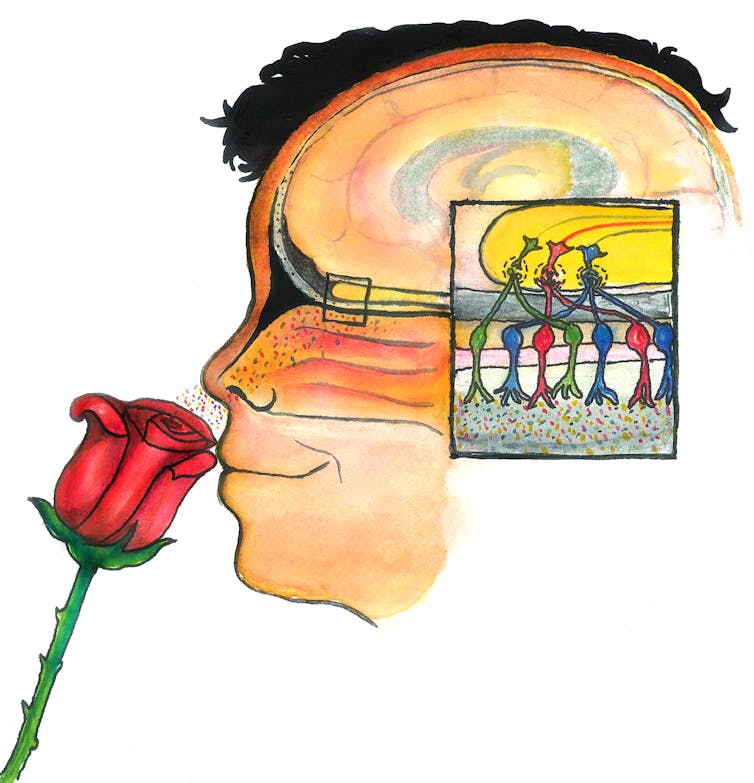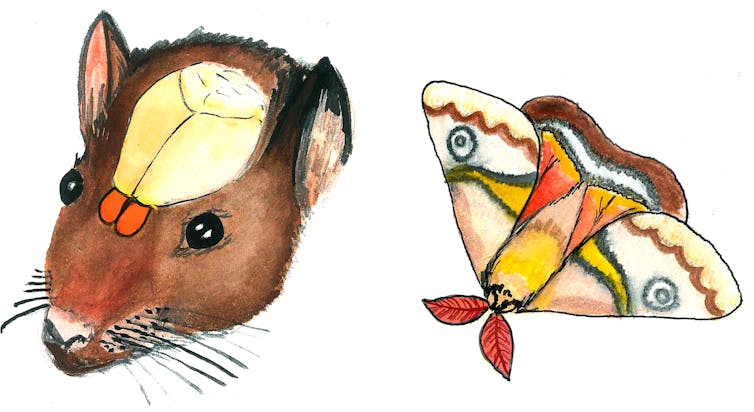Curious Kids: How do we smell?
- Written by Rodrigo Suarez, ARC DECRA Research Fellow, The University of Queensland
This is an article from Curious Kids, a series for children. The Conversation is asking kids to send in questions they’d like an expert to answer. All questions are welcome – serious, weird or wacky! You might also like the podcast Imagine This, a co-production between ABC KIDS listen and The Conversation, based on Curious Kids.
How do we smell? – Audrey, age 6, Brisbane.
Audrey, you have asked a question that humans have wondered about for centuries. And it’s only pretty recently we have started to really understand the answer.
Whenever we smell something, our nose and brain work together to make sense of hundreds of very tiny invisible particles, known as molecules or chemicals, that are floating in the air. If we sniff, more of these molecules can reach the roof of our nostrils and it is easier to smell a smell.
The fact that we have two nostrils allows our brain to detect small differences in the number of molecules that reach each one, so we can follow a smell trail just like tracker dogs. Have you ever tried finding where a smell is coming from? See how hard it gets with one nostril blocked.
The sense of smell also help us taste food. That is why food tastes bland whenever your nose is blocked.
Inside your nostrils, there are tiny things called neurons that “talk” to each other using electrical messages (our brains are mostly made of neurons too, by the way).
 Olfactory neurons (green, blue and red), located at the roof of the nostrils, recognise molecules and send electrical signals to neurons in the olfactory bulb (yellow). R. Suárez.
Olfactory neurons (green, blue and red), located at the roof of the nostrils, recognise molecules and send electrical signals to neurons in the olfactory bulb (yellow). R. Suárez.
Smell memories
These type of tiny cells, called olfactory neurons (olfaction means smell), have long cable-like connections that send electrical messages to a spot at the front of the brain, known as the olfactory bulb. Each olfactory neuron connects with a different neuron in the olfactory bulb, which then sends this information to other areas of the brain.
The parts of the brain that get these signals also do other things, such as storing memories or provoking emotions. That is why some smells can bring back old memories.
Even some older adults can remember the smell of their kindy class, or their grandparent’s house. Also, some smells can make us feel scared or happy, such as the smells of smoke or flowers. For example, the smell of freshly mowed lawn can help us relax.
Do you have nice memories of a place or food that you have smelt in the past?
How animals smell
The sense of smell is very important to almost all animals, as it helps them find food, recognise family members, and avoid danger.
For example, the nostrils of fish and sharks let them smell underwater, even though they breathe water through their mouths and gills. Some animals, like dolphins and whales, have lost the sense of smell as, over millions of years, their nostrils have moved to the top of their heads and evolved into blowholes.
The way smells are felt by the nose and brain is very similar in all animals. Even the way olfactory neurons work is also very similar to that of insects (but insects smell using their antennae, not with nostrils).
 The sense of smell works in similar ways in both vertebrates (mouse olfactory bulb in orange) and invertebrates (moth antenna in orange). R Suárez.
The sense of smell works in similar ways in both vertebrates (mouse olfactory bulb in orange) and invertebrates (moth antenna in orange). R Suárez.
The way the brain deals with smells is very different to how it deals with other senses, such as seeing and hearing. For example, we can identify the different instruments playing in a band, or the different shapes and colours in a painting. But it is very hard for us to tell the individual parts of a smell mixture.
We can feel the smell “orange” or “coffee” as a single thing, but have trouble identifying the many different parts that make up those smells individually. However, it is possible to get better at this with practice. Professional wine-tasters or perfume-makers can detect more parts of a smell mixture than most people.
Read more: Curious Kids: what's it like to be a fighter pilot?
Hello, curious kids! Have you got a question you’d like an expert to answer? Ask an adult to send your question to us. They can:
* Email your question to curiouskids@theconversation.edu.au * Tell us on Twitter
 CC BY-ND
Please tell us your name, age and which city you live in. You can send an audio recording of your question too, if you want. Send as many questions as you like! We won’t be able to answer every question but we will do our best.
CC BY-ND
Please tell us your name, age and which city you live in. You can send an audio recording of your question too, if you want. Send as many questions as you like! We won’t be able to answer every question but we will do our best.
Authors: Rodrigo Suarez, ARC DECRA Research Fellow, The University of Queensland
Read more http://theconversation.com/curious-kids-how-do-we-smell-104772



















